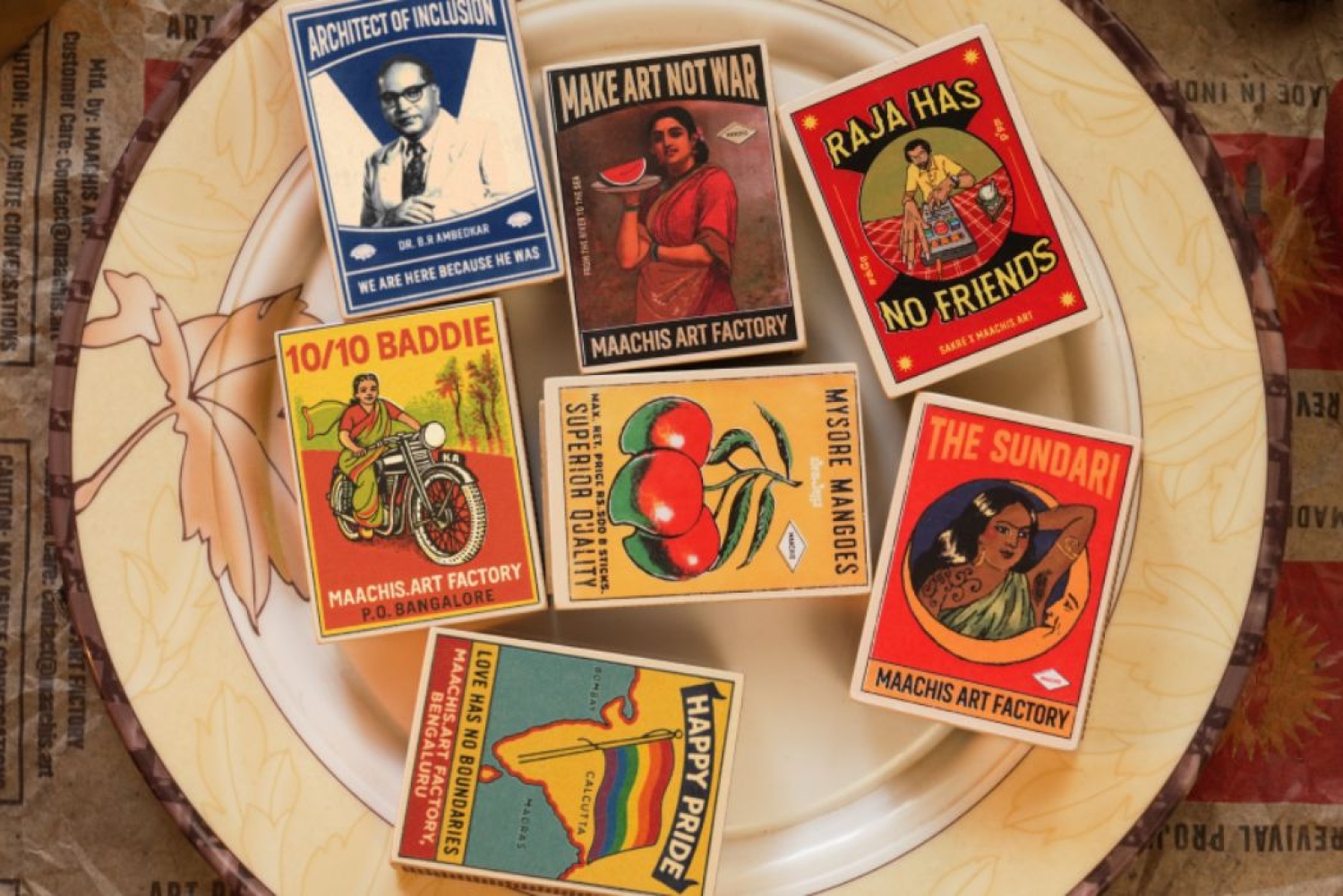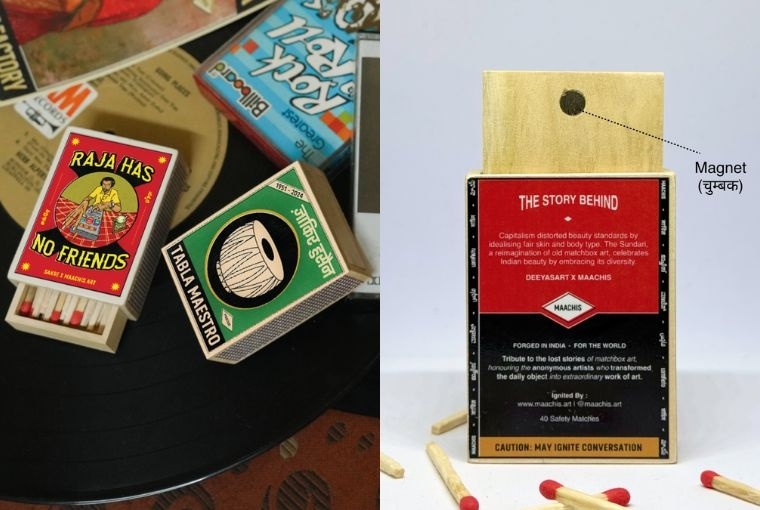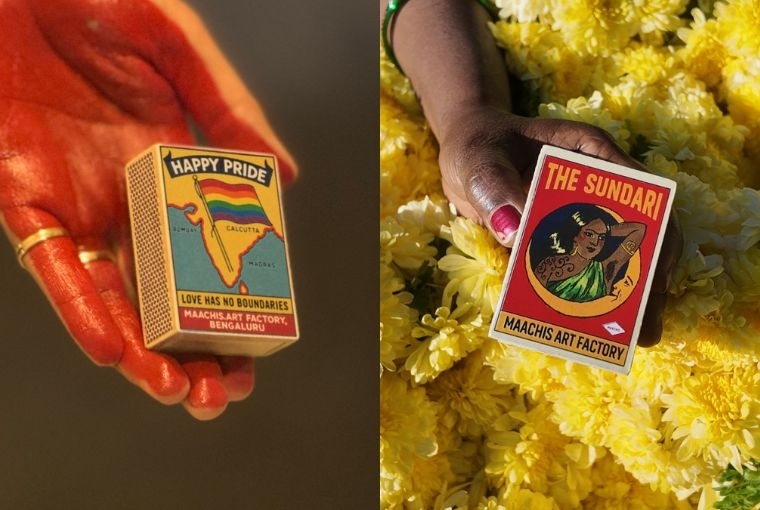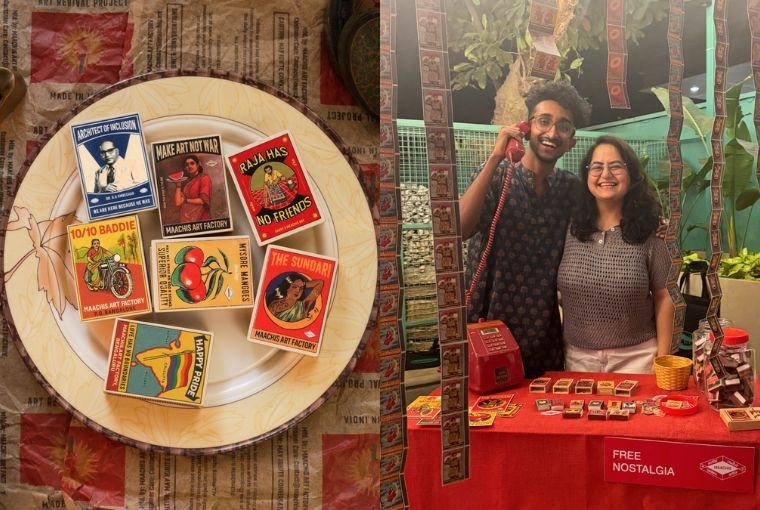

Although matchboxes have been an everyday essential in India for decades, they have never been ordinary. Matchboxes, from the very moment that production was done in India, by Indian people, became tiny canvases for art, posters, flags, and even symbols of nationalism or protest. The small cardboard boxes carried conversations and discourse straight to people’s homes, an unexpected platform for democratic messaging.
Even today, many understand the significance, both historical and aesthetic, of Indian matchbox designs, creating personal collections of the few matchboxes in circulation that still feature interesting designs. However, several companies have switched to standard designs for their boxes, printing the same brand name and logo rather than including any new artwork. To conserve the artistic history of Indian matchboxes, Maachis has dedicated itself to reviving Indian matchbox art.
Founded by designers Sonal Nagwani and Kevin Thomas, Maachis started with one classic design reimagined on a wooden matchbox, a spark that quickly grew as more and more designs were created. ‘We honestly didn’t set out to build a business in the traditional sense. We started this as a passion project, and as it grew, we realised we could turn it into a business and make a living doing art.’ Inspired not only by matchboxes but also by other everyday aspects of Indian visual culture, such as truck art, calendar designs, and textile labels, the two co-founders felt a need to preserve these Indian aesthetics. ‘The turning point came last year when we discovered Gautham Hemmady’s collection of vintage matchbox labels and met Farid Bawa in Varanasi, who’s working to revive Indian truck art. That’s when we realised these weren’t just utility objects. They were everyday canvases, holding memory, culture, and representation, often crafted by anonymous artists whose work never made it into galleries or archives.’ Using small wooden matchboxes as their canvases, Sonal and Kevin set out to create new designs, inspired by the original Indian matchboxes, which speak to today’s sensibilities. ‘We wanted to revive it not just out of nostalgia, but because it still has something to say. It’s essential because it preserves memory, celebrates everyday creativity, and gives value back to something we were taught to overlook.’

Maachis, true to the original matchboxes of India, does not shy away from social commentary. One of their matchboxes, The Sundari, features a lovely dark-skinned woman with a unibrow and body hair, encouraging people to abandon the distorted definition of beauty created by capitalism and colonialism, and rather embrace our skin and beauty. With a small warning label at the back, reading “CAUTION: MAY IGNITE CONVERSATION,” the brand is open with its mission to not only preserve Indian art, but also the diversity of thought and ideology that exists in India.
This June, in celebration of Pride, Maachis drew inspiration from a matchbox design from the past. Taking the Swathanthra matchbox, which was a symbol of patriotism and a call for independence and freedom, the brand reimagined the design to spark a new discourse (no pun intended), one around the fight for queer rights. With an outline of the Indian map and a pride flag on top, the brand is direct with its messaging, “love has no boundaries,” as it reads on the front of the box.

Along with matchboxes, Maachis also has t-shirts with the same prints as the fronts of their wooden matchboxes, keeping the designs alive on another, slightly larger canvas as well. Maachis is a brand started with love, for design, for Indian aesthetics, and for the ability to start conversations and discourse through art around topics that matter today. ‘We never really expected this project to find so much recognition so quickly. It almost feels like we're living in the future we imagined.’ Maachis aims to continue promoting Indian visual culture through collaborations as well as exploring new mediums to present their art. ‘We want to collaborate with artists, craftspeople, and brands who share the same values, and make sure the people we work with get the visibility and credit they deserve. The idea is to keep finding new ways to celebrate what was once overlooked and keep it alive for people to see, enjoy, share and remember.’
Words Ayushie Shahane
11.07.2025
